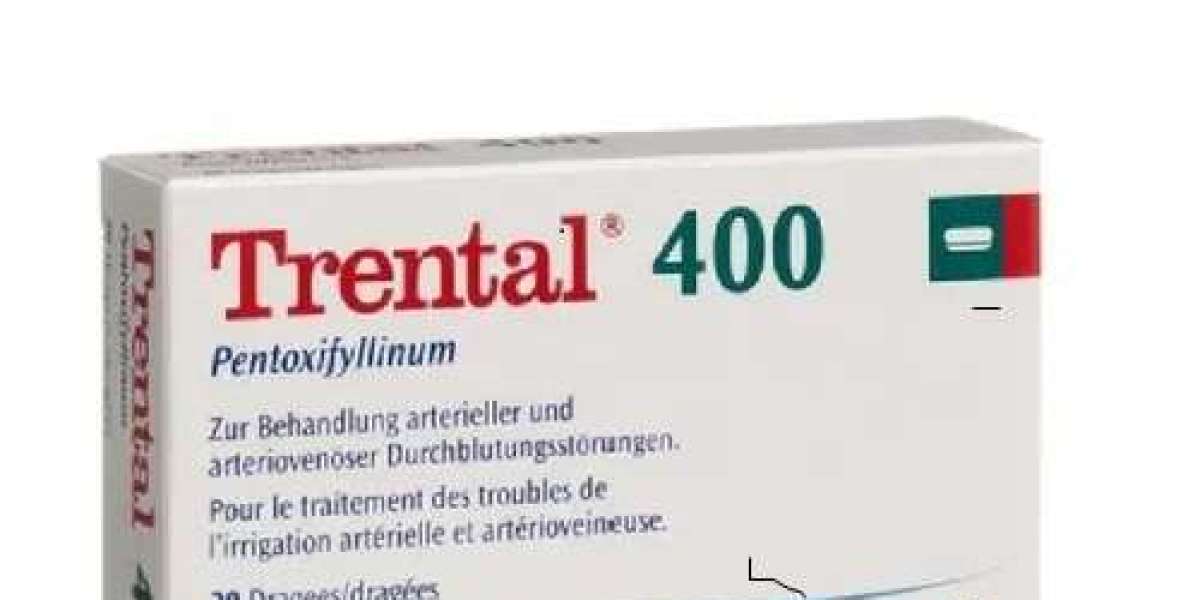Introduction:
Trental 400mg, also known by its generic name pentoxifylline, is a medication that plays a crucial role in managing various vascular disorders. Its mechanism of action revolves around improving blood flow and alleviating symptoms associated with compromised circulation. In this blog, we will delve into the intricate workings of Trental 400mg in the human body, shedding light on its pharmacological actions and therapeutic benefits.
Trental, also known by its generic name pentoxifylline, is a medication primarily used to improve blood flow. It is commonly prescribed to treat peripheral vascular disease, a condition in which there is reduced blood flow to the limbs, especially the legs. Here's how Trental 400mg works in the body:
Vasodilation: Trental helps to dilate (widen) the blood vessels, particularly the small arteries and capillaries. This dilation improves blood flow and oxygen delivery to tissues in various parts of the body, especially the extremities.
Reduction of Blood Viscosity: Trental decreases the viscosity (thickness) of blood by altering the properties of red blood cells. This helps blood flow more easily through narrowed or constricted blood vessels.
Anti-inflammatory Effects: Trental has anti-inflammatory properties, which may contribute to its beneficial effects in certain conditions. Inflammation can contribute to blood vessel constriction, and by reducing inflammation, Trental may help improve blood flow.
Improved Red Blood Cell Flexibility: Trental can enhance the flexibility of red blood cells, allowing them to pass through narrow blood vessels more easily. This property is particularly important in conditions where blood flow is compromised.
Trental Mechanism Of Action
Overall, Trental's mechanism of action is multifaceted, working on various aspects of the circulatory system to enhance blood flow. It is important to note that the use of Trental should be under the supervision and prescription of a healthcare professional, as it may not be suitable for everyone, and its use should be tailored to individual medical conditions and needs.
Blood Circulation and Vascular Disorders:
Before delving into the specifics of Trental 400mg, it's essential to comprehend the significance of proper blood circulation in the body. The cardiovascular system, comprising the heart and blood vessels, ensures the efficient transport of oxygen and nutrients to every cell and removes waste products. Disruptions in this intricate network can lead to various vascular disorders, including peripheral arterial disease (PAD) and intermittent claudication.
Mechanism of Action:
Trental 400mg exerts its therapeutic effects through multiple mechanisms, primarily centered around its ability to enhance blood flow. The active ingredient, pentoxifylline, is a methylxanthine derivative that exhibits vasodilatory properties, meaning it widens blood vessels. This dilation contributes to increased blood flow, especially in smaller vessels, and has a positive impact on tissue perfusion.
Rheological Properties:
One of the primary actions of Trental 400mg is its influence on blood rheology. It reduces blood viscosity, making it less sticky and more fluid. This property allows blood to flow more easily through narrow or constricted vessels, improving circulation to vital organs and peripheral tissues.
Anti-Inflammatory Effects:
Trental 400mg also possesses anti-inflammatory properties, inhibiting the release of inflammatory mediators. In conditions where inflammation contributes to vascular dysfunction, such as in PAD, these anti-inflammatory effects can help mitigate the inflammatory response, thereby improving blood vessel function.
Platelet Function Inhibition:
Platelets are blood cells responsible for clotting. Trental 400mg has been shown to inhibit platelet aggregation, reducing the risk of abnormal blood clot formation. This antiplatelet effect is particularly beneficial in preventing thrombosis and maintaining unobstructed blood flow.
Therapeutic Applications:
The unique combination of vasodilation, anti-inflammatory effects, and platelet function inhibition makes Trental 400mg a versatile medication for several conditions.
Peripheral Arterial Disease (PAD):
Trental 400mg is commonly prescribed for individuals with PAD, a condition characterized by reduced blood flow to the limbs due to atherosclerosis. By enhancing blood flow, Trental 400mg helps alleviate symptoms such as pain and cramping, allowing individuals to engage in physical activities with greater ease.
Intermittent Claudication:
Intermittent claudication is a symptom of PAD, marked by pain and cramping in the legs during physical activity. Trental 400mg, through its vasodilatory effects and improved blood flow, can extend the walking distance before the onset of symptoms, enhancing the overall quality of life for affected individuals.
Conclusion:
Trental 400mg, with its multifaceted mechanism of action, stands as a valuable therapeutic option for individuals grappling with vascular disorders. By addressing the underlying issues of blood flow and inflammation, this medication offers relief from symptoms and contributes to an improved quality of life for those affected. As with any medication, it is crucial to consult with a healthcare professional to determine the appropriate dosage and ensure its suitability for individual health conditions.






